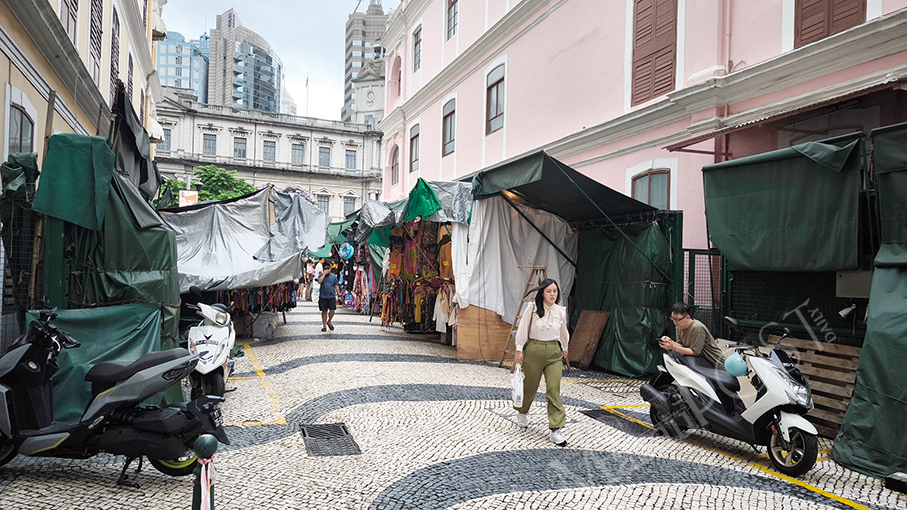The government has finished drafting a bill regulating the operation of the city’s street vendor stalls, which proposes that licences to operate the stalls will be granted through public tender, a change from the current practice in which available stalls are simply allocated through lucky draws.
The bill has been submitted to the Legislative Assembly (AL), which uploaded the bill on its website on Tuesday and scheduled yesterday a plenary session next Tuesday for debate and a vote of its outline.
The government’s newly proposed system on street vendor stalls comes after a new law regulating the operation of the city’s wet-market stalls took effect on January 1, 2022.
The current wet-market law has replaced municipal regulations concerning wet-market management drawn up several decades ago.
In addition to fresh food stalls proper, some of the city’s nine wet-market buildings are also housing vendor stalls selling various non-food daily necessities such as stalls selling apparel and household items in the Iao Hon wet-market municipal complex.
The bill submitted to the legislature only covers vendor stalls operating in various streets across the city designated by the Municipal Affairs Bureau (IAM) as areas earmarked for vendor stalls. The bill does not cover the vendor stalls selling non-food items operating in the government’s wet-market buildings as they are regulated by the current wet-market law which came into force in 2022.
Rules dating back 1970s & 1980s
The bill’s explanatory note, which was also released on the legislature’s website on Tuesday, points out that the current municipal regulations concerning street vendor stalls were drawn up in the 1970s and 1980s, which “obviously” cannot meet Macau’s current socioeconomic situation.
The bill’s explanatory note says that the government has drafted the proposed new legal system on street vendor stalls after thoroughly listening to opinions from civil society and referencing the systems on regulating street vendor stalls in neighbouring regions and certain rules listed in Macau’s current wet-market law while also taking the city’s real situation into account.
According to the current wet-market law, the lease and operation of stalls must be granted by public tender except in special circumstances, a change from the previous practice in which available stalls were simply allocated through lucky draws.
Similar to the current wet-market law, the bill proposes that licences to operate street vendor stalls must be granted through public tender except in special circumstances, a change from the current practice in which available stalls are simply allocated by lucky draw.
Macau’s nine wet markets comprise seven on the peninsula, plus Taipa and Coloane having one each.
According to the IAM website, there are about a dozen street areas across the city used for the operation of vendor stalls selling fresh and cooked food, as well as various non-food goods such as apparel, toys and various other daily necessities.
Bid assessments
Similar to the current wet-market law, the bill on street vendor stalls proposes that the Municipal Affairs Bureau will assess bids for licences to operate stalls based on various criteria such as the potential bidders’ proposed operation plan, their experience in running stalls, their proposed operating hours, the level of diversity of their goods, and the availability of various payment methods that shoppers can choose.
Both the current wet-market law, which has been in force since January 2022 after its bill was passed by the legislature in its final reading in June 2021, and the new bill on street vendor stalls aim to ensure that vacant stalls will only be allocated to those who are genuinely dedicated to running their business.
The government carried out a public consultation in 2018 on its proposed new system of wet-market stalls and another one on street vendor stalls. However, the government submitted its bill on wet-market stalls to the legislature first in 2020, before finally submitting its bill on street vendor stalls to the legislature.
Tougher requirements
According to the bill on street vendor stalls, stallholders will be required to “continuously” open their stalls throughout the year in compliance with terms and conditions listed in their licences, without being allowed to close their stalls any time they want unless they obtain permission from the Municipal Affairs Bureau under special circumstances.
In addition, the bill also proposes that a street vendor stallholder proper, i.e., the person holding the licence to operate his or her stall, must work there in person for at least 240 days a year.
The two proposed provisions are similar to the ones listed in the current wet-market law.
The bill proposes tougher fines and penalties on street vendor stallholders violating rules, compared to the current municipal regulations concerning street vendor stalls.
The bill proposes rules making it easier for the Municipal Affairs Bureau to cancel violators’ stall-operating licences.
According to the bill, a licence to operate a street vendor stall will be valid for one year and can be renewed every year.
The government has said that some street vendor stallholders fail to be fully dedicated to running their business by keeping their stalls closed for long periods of time and that the current regulations are unable to punish such stallholders.
For many years, the government has exempted wet-market stallholders from paying their monthly rents and street vendor stallholders from paying their annual licence fees.
When announcing the bill during a press conference on Friday, IAM Administrative Committee member Ung Sau Hong said that 569 residents are currently holding licences to operate street vendor stalls.

A woman walks past vendor stalls near Largo do Senado, the city’s main square, on Tuesday. – Photo: Tony Wong




